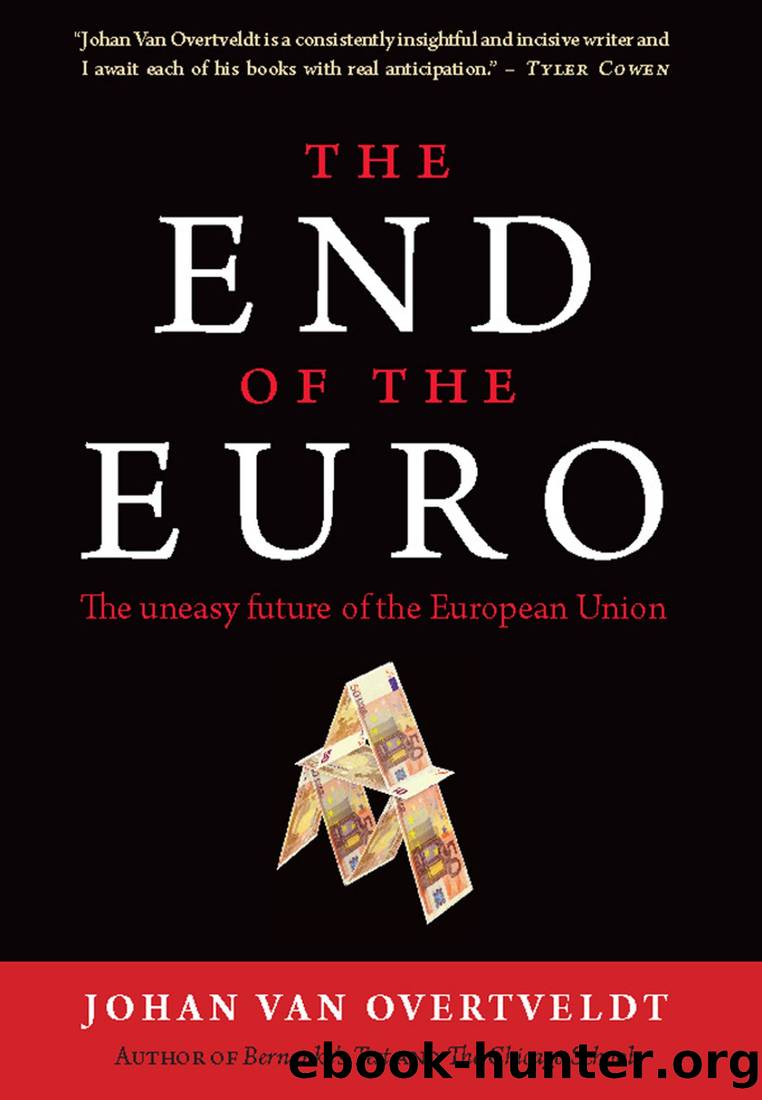The End of the Euro by Johan Van Overtveldt

Author:Johan Van Overtveldt [Overtveldt, Johan Van]
Language: eng
Format: epub
Published: 0101-01-01T00:00:00+00:00
Limited Liability
Markets remained nervous during the final weeks of 2010. A European summit was scheduled for December 17 and 18. In the week before the summit, IMF Managing Director Dominique Strauss-Kahn urged the eurozone authorities âto provide a comprehensive solution to [the eurozone] problem.â268 The Institute of International Finance, a banking lobby organization, released a report estimating that during the year 2011, governments would have to raise $2 trillion and banks $1 trillion to refinance their debt.269 While the Irish government introduced a courageous budget that included 4 billion euros in spending cuts and 2 billion euros in tax increases, Moodyâs substantially downgraded the country because its banking problems were so severe. On December 15, violent protests in Athens against the Greek governmentâs austerity measures led to the brutal attack on the street of one former minister.
At the summit, the European leaders confirmed that from 2013 onwards the rescue mechanism would have a permanent character. Although strong German opposition prevented any decision on increasing the size of the fund, Europeâs top politicians agreed that the bailout fund would always have the means to rescue any faltering eurozone member. Under German insistence, leaders also agreed that the fund would be subject to national veto and strict conditions. The details would be hammered out in March 2011. Despite political rhetoric, uncertainty reigned about the eurozoneâs course.
In the financial press, the European authoritiesâ lack of direction came through loud and clear. John Plender of the Financial Times summarized it perfectly: âWith no shared diagnosis of what is wrong with the workings of the monetary union, still less of what should be done, the future of the union looks uncertain, at best.â Irwin Stelzer, former Rothschild investment banker and fellow of the Hudson Institute, claimed, âThe Eurocracy responded (to the crisis) with a farcical promise to set up an unspecified structure to raise an unspecified sum to pay an unspecified portion of [the] bills. Germany permitting.â270 Focusing on Germanyâs crucial role, Wolfgang Münchau of the Financial Times concluded that âhaving prioritised unification in the past 20 years, Germany is now prioritisingâ¦the integrity of the eurozoneâ¦but not in the same order of magnitudeâ¦Germany is now prioritising limited liability.â271
During the European summit, Trichet gave a presentation in which he criticized the European political authoritiesâ approach thus far as counterproductive, claiming that it had increased market uncertainty.272 Well aware that certain countries, France among them, favored a much more active role for the ECB, Trichet argued strongly against intensification of the ECBâs interventions in the secondary bond markets. The ECB announced at the summit that the member countriesâ national banks had agreed to increase the subscribed capital of the ECB to 10.8 billion euros. The ECB indicated that this larger capital cushion was needed to cover the risks the central bank had assumed in fighting the crisis. This was not only an admission that the quality of the collateral offered by banks from the peripheral countries was decreasing, it was also a warning that the ECBâs role in fighting the euro crisis would cost the politicians.
Download
This site does not store any files on its server. We only index and link to content provided by other sites. Please contact the content providers to delete copyright contents if any and email us, we'll remove relevant links or contents immediately.
The Fifteen Biggest Lies about the Economy: And Everything Else the Right Doesn't Want You to Know about Taxes, Jobs, and Corporate America by Joshua Holland(1115)
The Economist (20210109) by calibre(933)
The World For Sale by Javier Blas(861)
Made in China by Anna Qu(849)
Philippines--Culture Smart! by Culture Smart!(711)
Mission Economy by Mariana Mazzucato(690)
Boom and bust a global history of financial bubbles by Quinn William Turner John(677)
Forex Trading All In One For Dummies by Mishra Mamta(663)
Big Money by Kenneth P. Vogel(649)
The Dictatorship of Woke Capital by Stephen R. Soukup(647)
The Money Revolution by Anne Boden(646)
The New Retirement Savings Time Bomb by Ed Slott(634)
Tax the Rich! by Morris Pearl(630)
Green Public Procurement under WTO Law by Rika Koch(628)
Cross Winds: Adventure and Entrepreneurship in the Russian Far East by Myers Steven(615)
The Inflation Myth and the Wonderful World of Deflation by Mark Mobius(607)
Fundamentals of Finance by Mustafa Akan Arman Teksin Tevfik(582)
European Yearbook of International Economic Law 2017 by Marc Bungenberg Markus Krajewski Christian Tams Jörg Philipp Terhechte & Andreas R. Ziegler(580)
The Great Demographic Reversal by Charles Goodhart & Manoj Pradhan(579)
